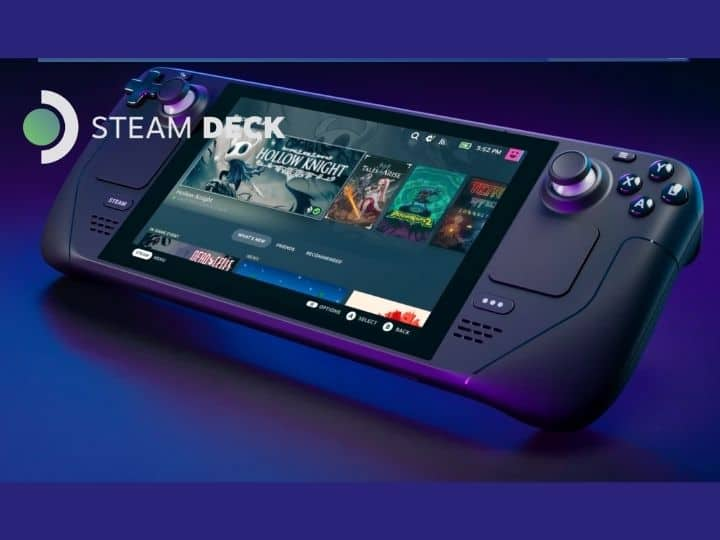Steam Deck: 10 Things To Know About The New Portable Gaming Device
Steam Deck could well take PC gaming to another, truly mobile, level. Here are 10 facts that you need to know about this potentially revolutionary gaming device.

By Akriti Rana and Nimish Dubey
Announced in July 2021, the Steam Deck is a portable gaming device that focuses on PC gaming. It looks like a Nintendo Switch or a PlayStation Portable (remember that one?) — a panel with a display in the middle, flanked by gaming and control buttons on either side. The difference, however, is that the Steam Deck is looking to bring the PC gaming experience into the palms of your hands. We have seen instances of portable consoles running older titles, but the Steam Deck is looking to deliver the latest and greatest in PC gaming in a handheld form factor, with minimum compromises.
Launched on 25 February, the Steam Deck could well take PC gaming to another, truly mobile, level. It could also herald the arrival of a whole new kind of gaming device. Here are ten facts that you need to know about this potentially revolutionary gaming device that has just arrived in the international market:
It Is Very Much A Two-Handheld!
The Steam Deck is a handheld device, but it is a large one. By "large", we mean that it is actually much bigger than a Nintendo Switch console or a Asus ROG gaming phone. There is just no way in which you can use the Steam Deck with one hand. It is designed to be used always in landscape mode. It is 298 mm long, 117 mm wide and 49 mm "thin," and weighs 669 grammes. For the sake of comparison, the Nintendo Switch OLED is 242 mm long (with controllers attached), 102 mm wide, 13.9 mm thin, and weighs about 420 grammes. The Steam Deck is longer than two iPhone 13 devices placed one on top of the other vertically, and weighs four times as much as a single iPhone 13! That said, it is still MUCH smaller than the smallest gaming notebook.
In terms of design, it follows the Sony PlayStation Portable model of having a display in the middle, flanked by panels containing control and navigation buttons on either side. Mainly made of plastic, it is designed more for function than for style. It is compact enough to slip into a bag, but do not attempt to place it in your trouser or jacket pockets!
The Processor Is The Star, And RAM Is NOT An Issue
What makes the Steam Deck really special, however, is its processor. The device comes with what it terms an "APU," which is a special blend of CPU and GPU architecture designed by AMD. Within this is the AMD Zen 2 architecture, similar to the one seen on AMD Ryzen 3000 processors. Graphics are handled by the RDNA 2 architecture. Each device comes with 16GB of LPDDR5 RAM. There are three storage options - 64GB eMMC, 256 GB SSD and 512 GB SSD. There is also support for expanding storage using a memory card - you would need a speedy one to make sure there are minimal lags in your gaming experience.
Those specs, by all accounts, are more than enough to make this handheld device capable of handling games that run on power hungry PCs. It is capable of running a full-fledged desktop operating system, in fact (more on that later).
ALSO READ | 6 Things Gaming Phones Can Learn From The Nintendo Switch
The Display Might Seem Underwhelming
The Steam Deck features a large 7-inch touchscreen display. However, in terms of pure specs, it does not seem to pack a massive punch. It is of HD resolution (1280 x 800), rather than full HD, and is an LCD panel rather than an AMOLED one. What's more, it has a "normal" refresh rate of 60 Hz and a typical brightness of 400 nits. On paper, that would make it appear inferior to some of the displays we see even on Rs 15,000 phones. However, Valve claims that it is not only more than enough for handling games, but also saves battery life. Those who love hefty specs might not like this, but it needs to be remembered that even the display on the Nintendo Switch is neither full HD nor does it have a high refresh rate.
A Truckload Of Controls And Ports
While the Steam Deck comes with a touchscreen display, most PC gamers tend to play games using physical controls, which is why the device is packed with buttons and connectivity options. You get the classic, A, B, X and Y game controller buttons, as well as left and right analog triggers and bumpers. There are also buttons for View and Menu and four assignable grip buttons. There are two analog sticks and two square trackpads with haptic feedback. It is basically a display placed in the middle of a game controller.
In terms of connectivity, the Steam Deck comes with Bluetooth 5.0 and Wi-Fi. There is no 4G or 5G connectivity right now. The USB Type C port can be used for both charging the device as well as for connecting it to a display - it can support 8K videos at 60Hz or 4K videos at 30Hz. There are also stereo speakers and a 3.5 mm audio jack, as well as a dual microphone array.
Runs On Linux, But Can Run Windows
The Steam Deck runs on Valve's own special operating system (OS) called SteamOS. This has been developed by Valve and is based on Linux. The device and its software are however, an open platform and if you wish, you can install Windows on it. As we said earlier, the hardware on the device is more than capable of running a full-fledged desktop OS.
ALSO READ | Asus ROG Phone 5s: A Phone Surely Made Just For Gamers
Can Play Most Steam Games
The Steam Deck has been designed by Valve, which also owns the Steam gaming platform, which has thousands of games on it. Logically then, Valve's own gaming device should run all Steam games on it. That however, is not the case.
While most games can run on the device, some still cannot or do not run optimally. Part of the reason for this is supposed to be the fact that the Steam Deck runs on Linux, and most of the games on Steam are designed for Windows.
Uses Proton To Run Windows Games
The Steam Deck allows gamers to run games designed for Windows, using a compatibility layer known as Proton. While this is a largely smooth experience, all games do not work well with it. Valve has currently classified Steam Deck games as "verified" (which run perfectly), "playable" (which run fine with a few changes to settings) and "Unsupported" (which do not run on the Steam Deck). The list of "Verified" games is expanding, though, and most high-profile PC titles on Steam can be played on the Steam Deck. Valve is believed to be testing its game library and updating the list of games that can be played on the Steam Deck. Given the size of the library, it might take some time.
Incidentally, games that run on Windows but are not on Steam can run on the Steam Deck, but the experience is not likely to be a good one. Games like World of Warcraft and Fortnite will not play nice with or on the Steam Deck.
ALSO READ | Call Of Duty Series Skipping Annual Game Launch In 2023: Details
Not The Greatest Battery Life
Battery life has always been an Achilles Heel for portable gaming consoles. The Steam Deck is no exception. It comes with a 40 Whr battery which can be charged using the 45W USB Type-C PD 3.0 charger in the box. The device's battery life is said to be between two and eight hours, depending on the settings and the games being played on it. Most early users are reporting two to four hours of resource heavy gaming, which is on the lower side. Hopefully, Valve might come up with some battery packs to extend gaming sessions on the device.
Very Competitively Priced
One of the great attractions of the Steam Deck is its pricing. While a good PC gaming is likely to set you back by close to USD 750 or even USD 1000, the Steam Deck starts at USD 399 for its 64 GB variant, with a 256 GB variant available for USD 529, and a 512 GB one available for USD 649. That is actually only USD 50 more than the Nintnedo Switch AMOLED edition which starts at USD 349. Mind you, given how resource-hungry PC games are, we would not recommend going for a 64 GB model, as the storage is unlikely to be enough unless you believe in playing only one game at a time, and keeping one or two titles on the device at the most.
It Is Not Expected Soon In India
If you are looking to get a Steam Deck for yourself in India, the news is not very good. As far as we know, Valve has no plans to bring the Steam Deck to the Indian market in the coming months. However, there is every chance that "unofficial" versions of the product will be available on e-commerce platforms like Amazon by June or even earlier. Gamers will have to be ready to pay a premium above the USD 399 price, though, and be prepared for the fact that there would be no official warranty beyond the seller's assurance. Just like the Nintendo Switch.






































